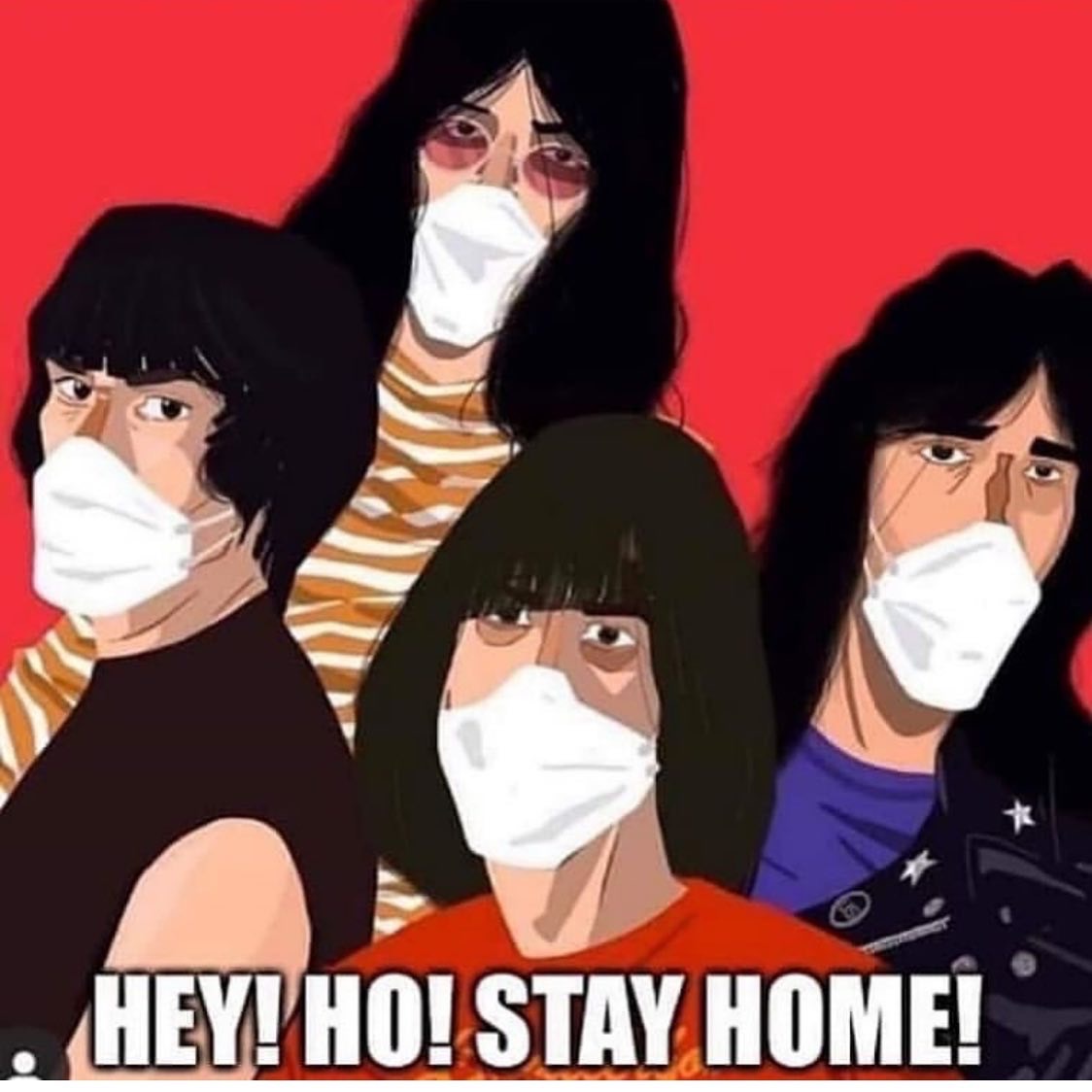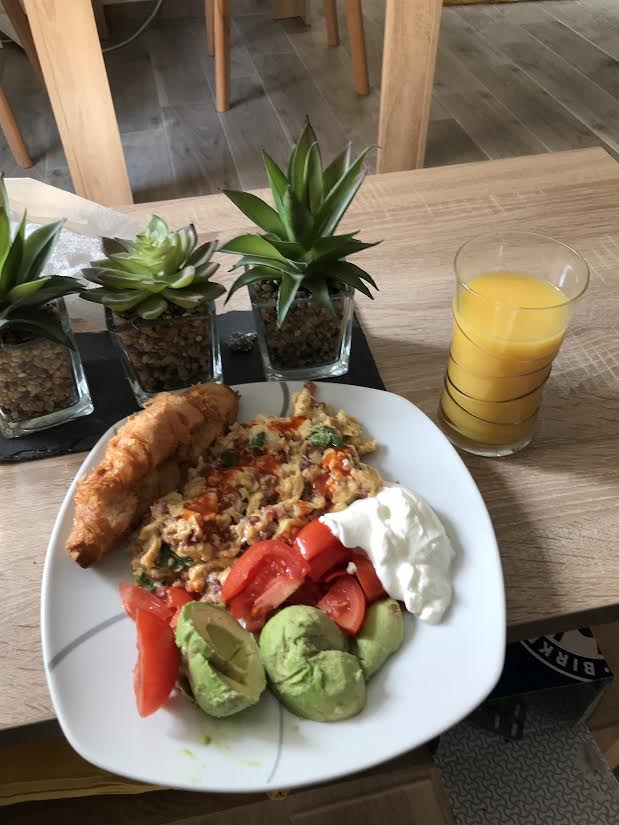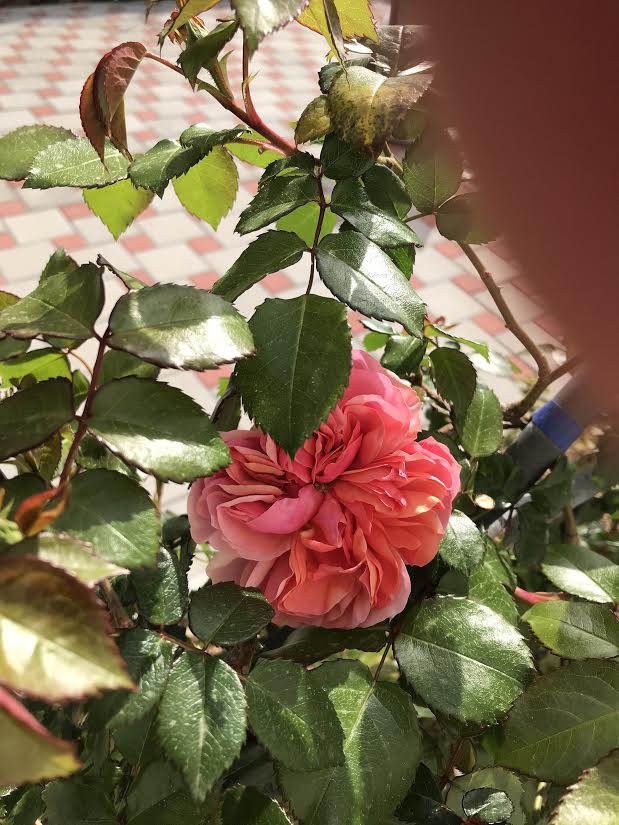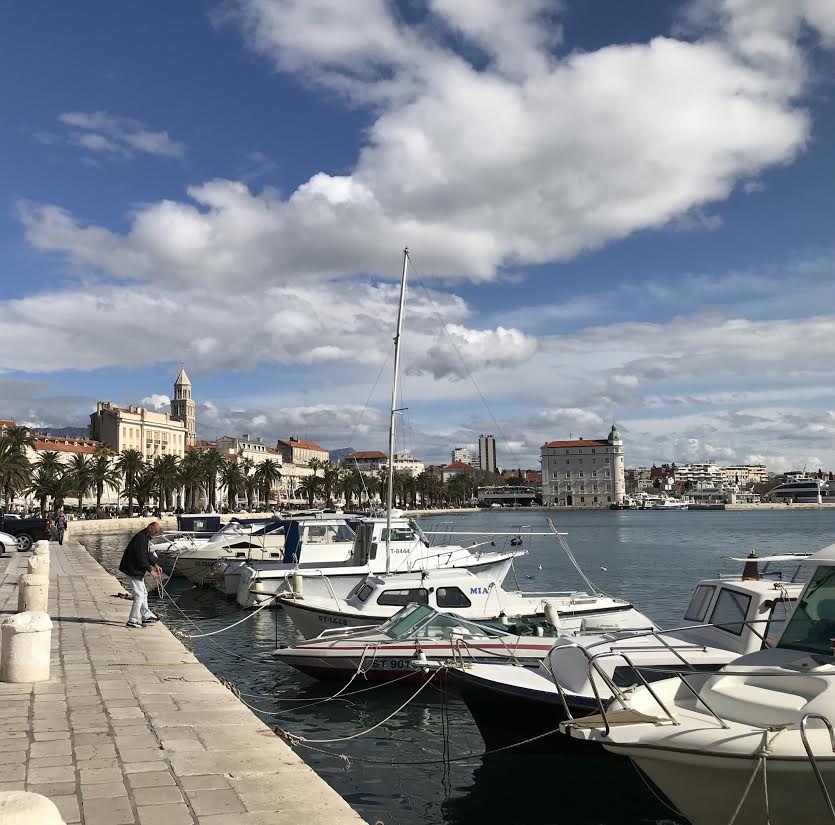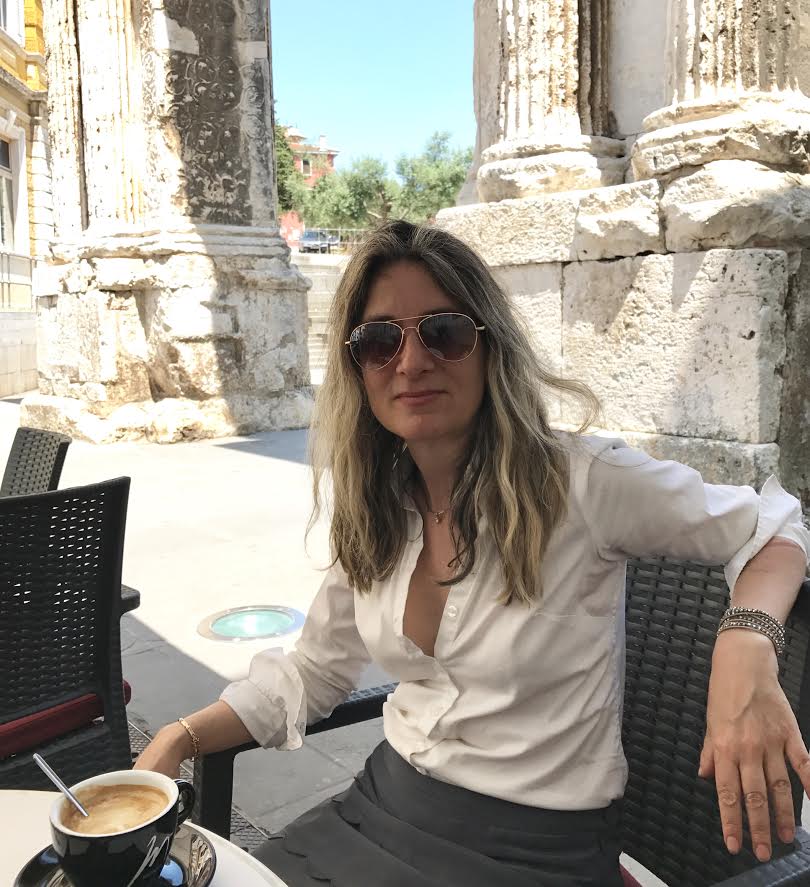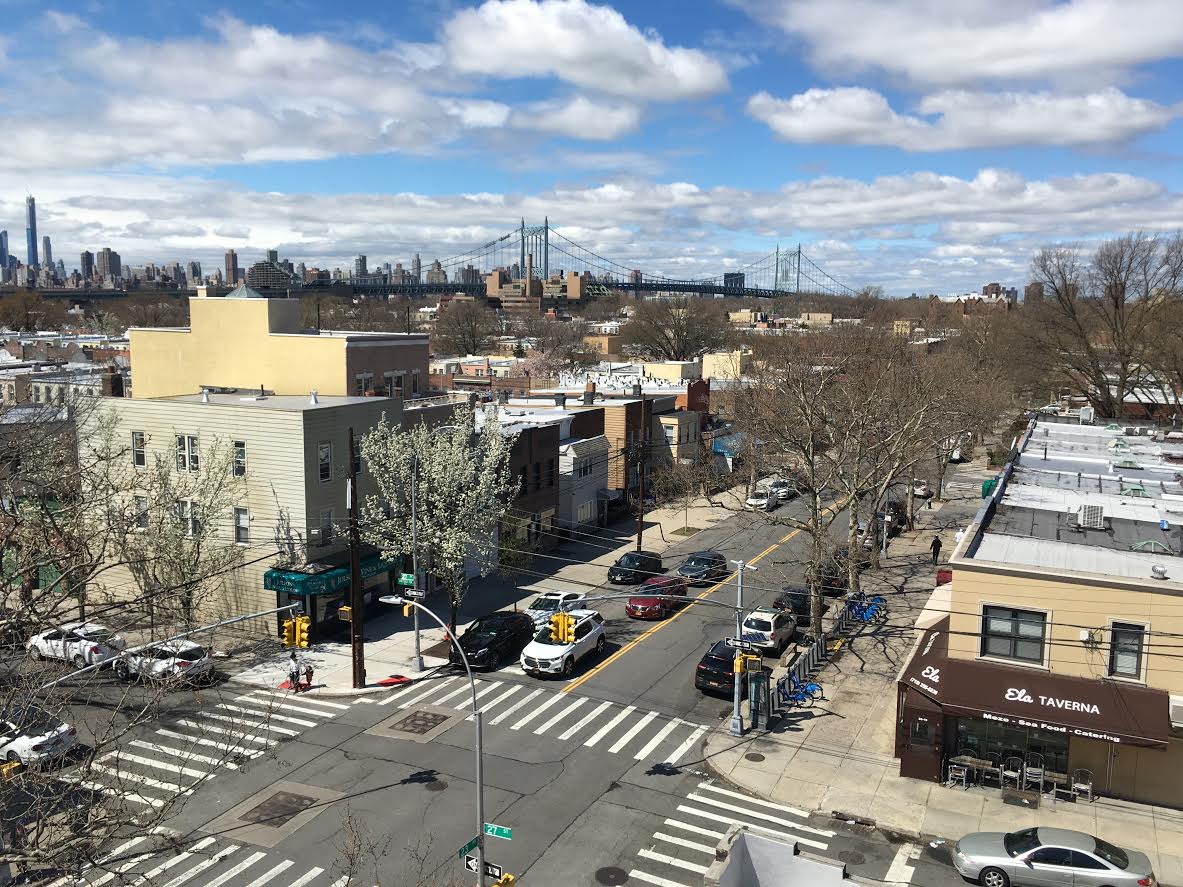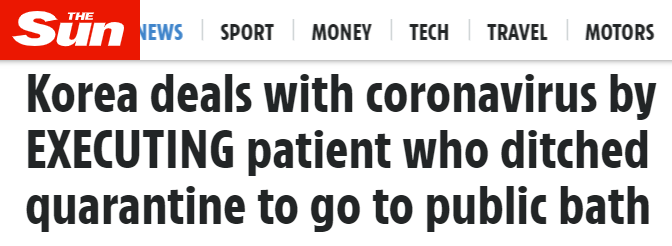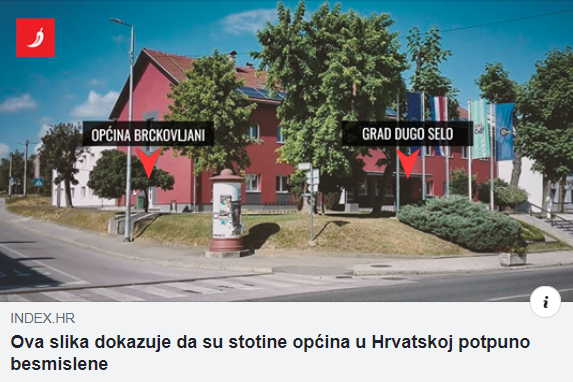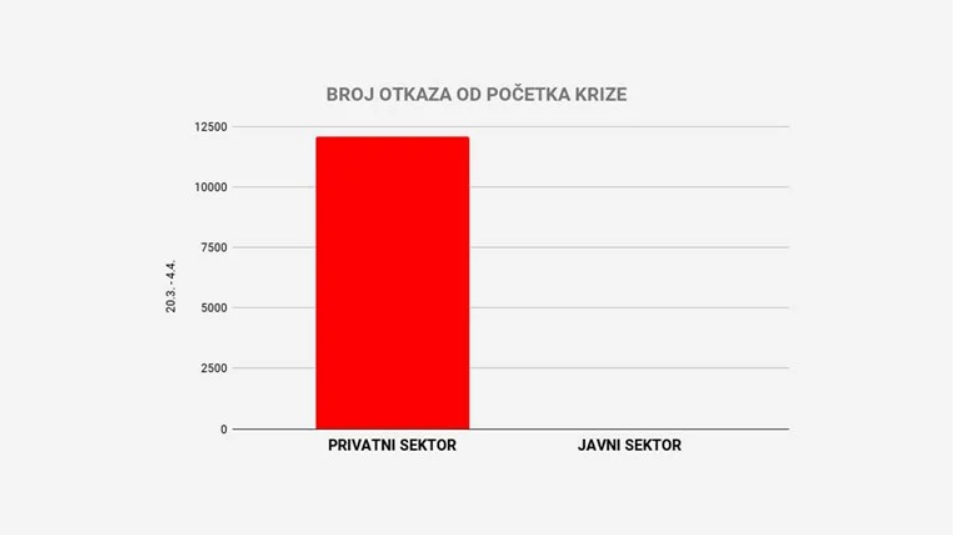Foreigners Self-Isolating in Croatia: Do You Feel Safer? Daniela from California in Split
April 7, 2020 - Do foreigners in Croatia feel more or less safe sitting out COVID-19 here than in their home country, and what are their experiences? A new series on TCN, with Daniela Rogulj from California in Split as our 29th contributor.
Oxford University recently published some research on government responses to coronavirus which showed that Croatia currently has the strictest measures in the world. While inconvenient, this is a good thing in terms of reducing the spread of the virus, and I am certainly not alone in my admiration of the official Croatian handling of this crisis in recent weeks, both in terms of action and communication.
But what do other expats here think? And how does it compare with the response in their home country? Would they rather sit this one out here or there? In the first of a new series on TCN, we will be featuring expats from all over the world to see what their views are on life in corona Croatia rather than back home. So far we have heard from expats in Croatia from Romania, USA, Ireland, UK, Mexico, Argentina, Spain, Singapore, Holland, Canada, India, Hong Kong, Venezuela, Latvia, China, Honduras, Hungary, Moldova, South Korea and Germany. Next up, TCN's Daniela Rogulj from California in Split.
If you would like to contribute to this series, full details are below. Now, over to Split.
Firstly, how are you? Are you alone/with someone? Tell us a little about your situation and sanity levels.
I’m at home, in Split, with my mother, father, and grandmother, all of whom are high risk. My grandmother is 87 and, as you’d expect, has a lot of underlying health conditions at her age. My father is no spring chicken at 66, while my 59-year-old mother just finished breast cancer treatment.
Our spirits are as good as they can be at the moment. Grandma is (mostly) blissfully unaware, and I would like to keep it that way, since she doesn’t leave her ‘bunker’ of an apartment below us anyway. She’ll ask once or twice a week about the latest news with a troubled expression stretched across her face. I tell her not to let any strangers in and to keep washing her hands. Her daily routine improved, in a way, since we can’t beg her to come out to dinner with us once a month. Any excuse to stay at home.
As any good Balkan mother would, my mother is often seen disinfecting the house multiple times a day with bleach, in between bouts of CNN and N1, while my recently-furloughed travel agent father now has the time to work through his immense music collection, composed of thousands of records, CDs, and box sets. I’m sure the whole Firule neighborhood could hear the speakers blast from our balconies - 'Tata Quarantino tunes of the day', I call it.
My life has changed a lot and not at all. Being a freelancer in Split for almost five years, I’m used to working from home and already have a routine in place. My mornings still begin with warm lemon water and articles for Total Croatia News, though with all of the corona news we have been covering, I’d say those days roll into the evenings fairly quickly - and the TCN team is easily working upwards of 14 hours/day on average. Since I have no reason to leave the house other than grocery shopping, I’ve converted my bedroom and balcony into my home gym and force myself to get 30 minutes of exercise every day. Fresh air and Vitamin D seem to be doing wonders for my mental health. The warm weather in Dalmatia lately is also a huge bonus - and a foolproof way to bypass burnout. And I couldn't imagine quarantining without my cats.
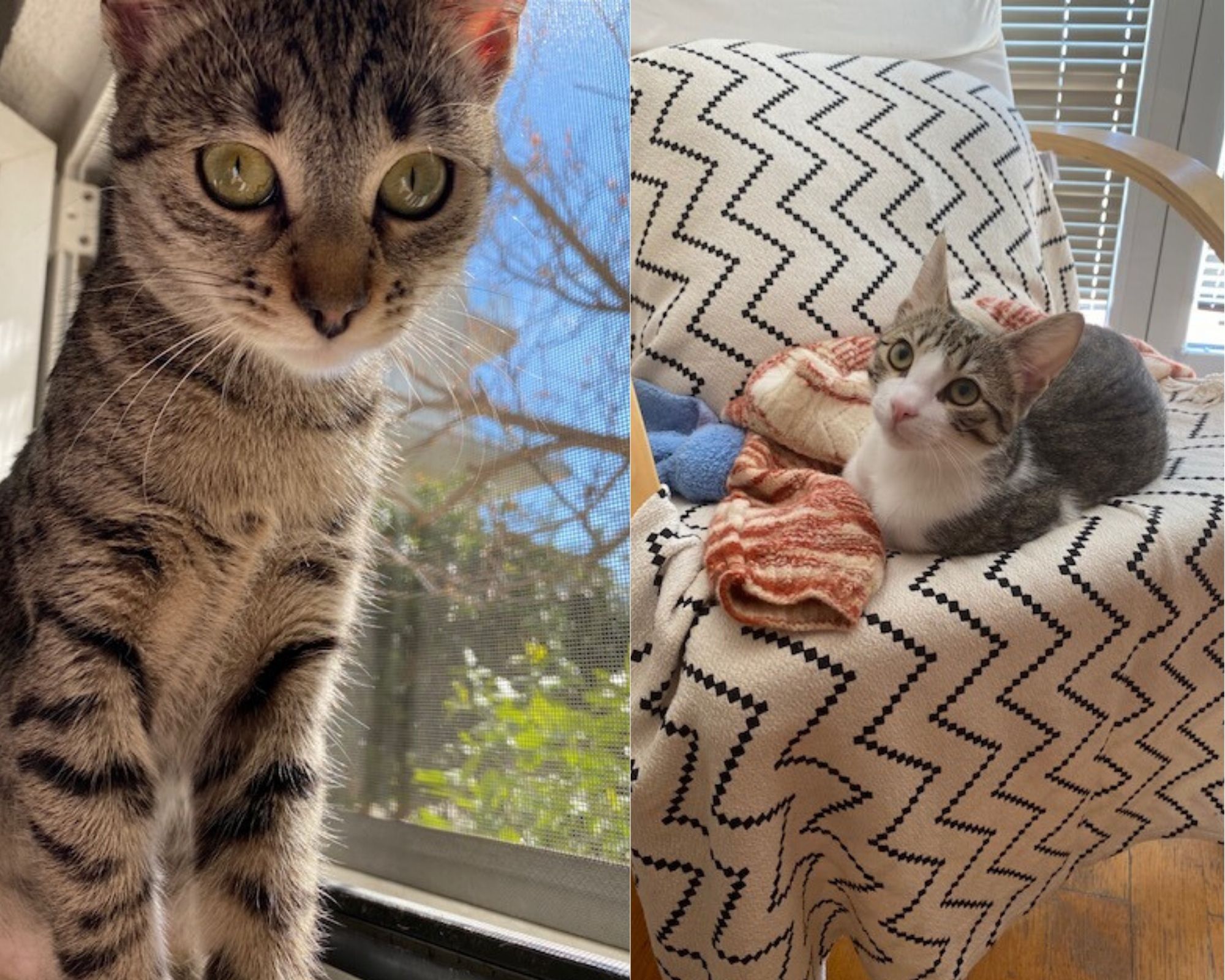
Keeping in touch with friends has been key, and Zoom chats are increasingly on my agenda - especially with my boyfriend, a water polo player for Jadran Split, who had to jet back to Australia 24 hours before Croatia went on lockdown… to prepare with the Aussie national team for the Olympics Games, which have been postponed for next summer. I’m not sure when I’ll see him again, but have hope his career will continue in Europe once all is said and done. Going through the corona crisis without your partner has certainly has its ups (I’m too busy for anyone else) and downs (for obvious reasons).
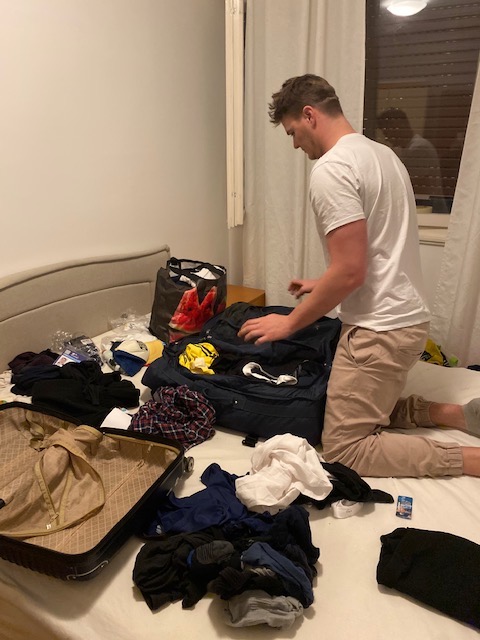
All things considered, my sanity levels are steady, though the bags under my eyes are growing darker.
When did you realise that corona was going to be a big issue?
About a week before my trip to London at the beginning of March. My boyfriend and I had a quick weekender planned March 5-8 as he had no water polo games scheduled at the time (the national teams of Croatia and Montenegro were using the month to prepare for the final Olympic qualifying tournament in Rotterdam). Croatia only had one case at the time, though the outbreak was spreading around Italy - and fast. Paul Bradbury (my lovely TCN boss) seemed to know before everyone that the coronavirus would take off here. I remember him telling me to rethink my London trip as he had a feeling borders would close soon. My mother begged us not to go, either, as she’d been in the middle of the corona buzz since day one, but I often shrugged her off as I thought she was panicking (in those early times, she was).
We got to London on a half-empty plane and took an Uber to our hotel to avoid public transportation, as that was the one promise I made to my mother, who packed us with gloves and face masks to wear while we were there. Life had not stopped in London, then. While there was a lot of talk, no one really seemed to be taking things too seriously and blamed the media for hype. We went to packed pubs, busy dinner spots, museums and markets, and even a Chelsea game.
It wasn’t until our flight back that things grew eerie. Heathrow was slower than ever, and our plane empty. When we arrived in Zagreb, the passport control woman asked if we’d been to China or Italy in the last two weeks. We got back to Split late that night and I was convinced that my sore throat was a symptom of COVID-19 - and not due to the fact that I was still nursing a hangover from two days before.

Things escalated in the following two days. Airlines began announcing cancellations in Europe, the Croatian Ministry of Tourism put all marketing activities to a halt, and Croatia went from 1 to eight cases in a matter of days. My mother begged me not to leave the house, and I didn’t. I have been self-isolating since March 11.
What is your impression of the way Croatia is dealing with the crisis? How safe do you feel?
Croatia is very lucky that former Health Minister Milan Kujundžić was dismissed just days before the coronavirus hit here, or else we’d be in big trouble.
Overall, I’m very pleased with how Croatia has dealt with the crisis. The National Civil Protection Headquarters is a team of superheroes and our shining light during this crisis, and they’ve done a brilliant job introducing measures early to keep the infection at bay and the numbers low.
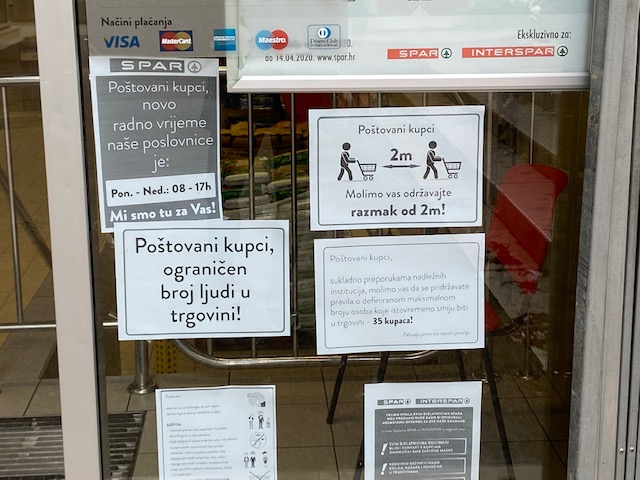
I feel safer than ever as the chances of getting hit by a bus or car are slimmer than ever (we all know how Croatian drivers can be). The streets are empty. The shops are taking proper hygiene measures and only allowing a certain number of shoppers in at once. They are also fully stocked, so IF things got really bad, at least I’d have enough toilet paper to get me through it. It’s rare to see anyone without a mask, and the two-meter rule is mostly taken seriously.
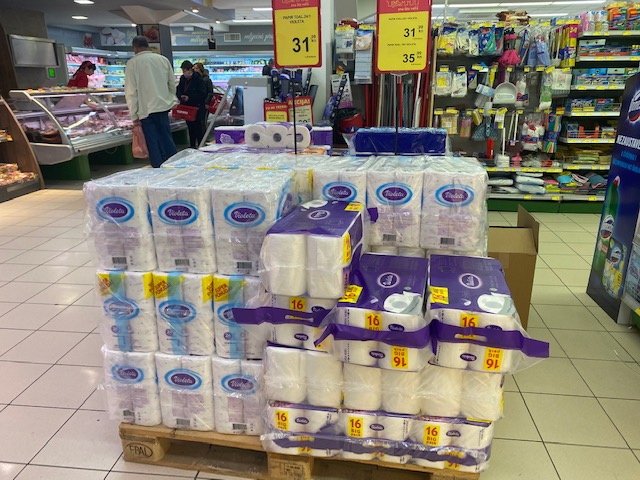
Is there anywhere better than Croatia to self-isolate, anyway?
Now compare that to your home country and how they are handling it. What is Croatia doing better/worse?
Yikes, where do I begin? The United States, as a whole, is a nightmare. They have a president who wanted the churches to be full on Easter, only to retract and say that 100,000 deaths is ‘very good’. The death toll has already topped 10,000. New York is scrambling to obtain ventilators and is already over 130,000 cases - and that’s just one state! I have to tip my hat to Governor Andrew Cuomo, who is doing the best he can given the circumstances.
I am from California, where Governor Gavin Newsom ordered a mandatory ‘shelter in place’ to all 40 million residents in the state early on. Only grocery stores and essential retail are open, while restaurants and bars are delivery only, large gatherings are banned, and social distance learning is in place for schools. California currently has over 15,000 cases and is 4th in the US.
Croatia wins on taking measures earlier than the US as a whole, though it’s hard to compare a country of 4 million and 327 million.
What about official communications from the authorities, compared to your home country?
Are we basing this off of the daily White House briefings? Enough said.
What the Fauci?
— Lauren Werner ? (@LaurenWern) March 20, 2020
Dr. Anthony Fauci curbs his Trump enthusiasm. pic.twitter.com/HRFKKVmuW8
Also, thank you, Paul, for putting me on the live corona updates, so I always know what’s going on in Croatia at any second of the day.
What's the one thing you wish you had taken with you into self-isolation.
My trainers, who have been amazing and publishing all workouts online (thank you F & T). I also wish I brought my will to drink with me, since I haven’t had an alcoholic beverage since March 8, and feel like a chilled gin & tonic would spice up the corona updates nicely during happy hour.
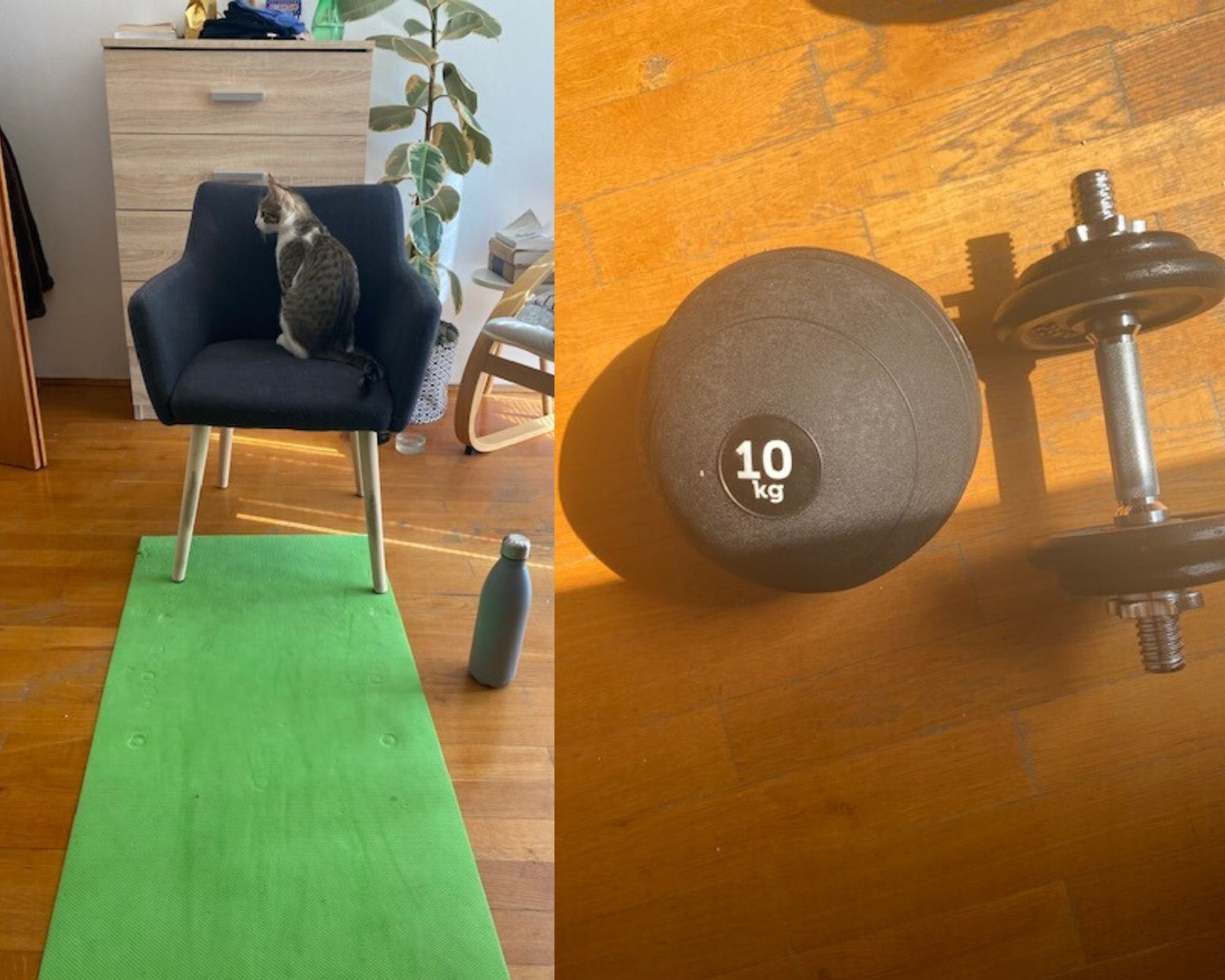
Maybe another sweatshirt to add to my rotation weekly rotation would have been smart, too.
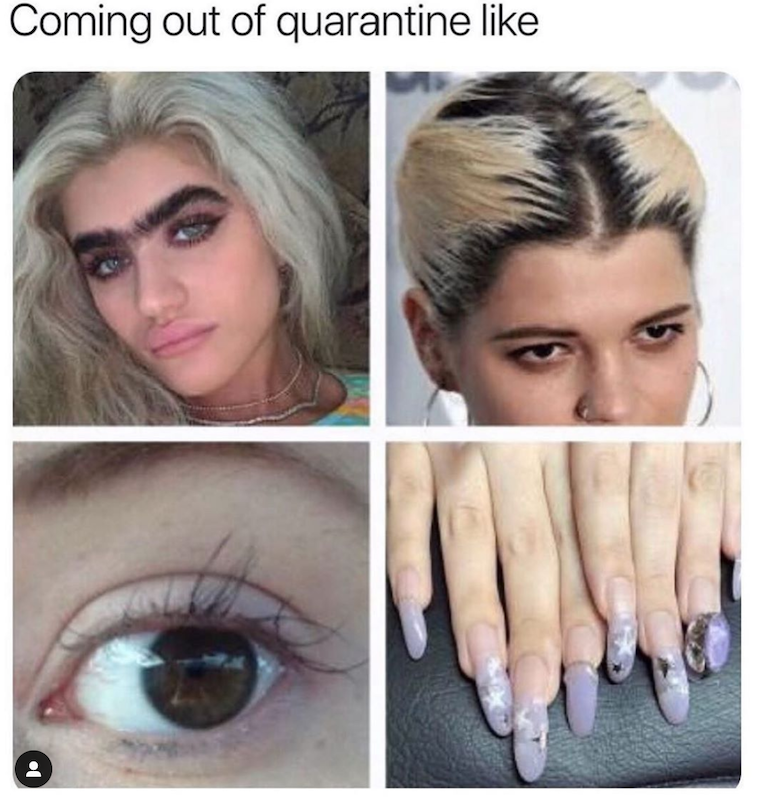
I am grateful, however, that I am a relatively low-maintenance woman who will not suffer too severely from her beauty salon closure, though I do wish I learned how to do my eyebrows properly before all this hit.
One thing you have learned about yourself, and one thing you have learned about others during this crisis.
As I mentioned above, I’ve been more or less self-isolating since March 11, which is nearly a month, and not once have I felt restless or anxious, which is a bit out of character. Maybe I’m numb to it all by now, or maybe I’ve grown into the homebody I always knew I was. But I feel good; a bit tired and nostalgic here and there, but good. It’s important to go with the flow, because we can only live one day at a time right now, and I think that is a massive lesson I've learned through this.
This crisis also made me a bit more generous. While my bank account certainly isn't growing, I’ve been donating to various animal shelters across Croatia since I am essentially 'saving' money on taxis, coffee dates, and nights out. It’s a win-win, isn't it?
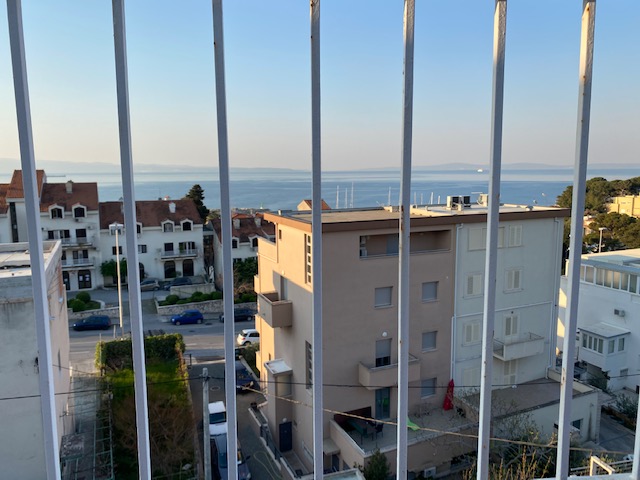
There is a lot of uncertainty in the world at the moment and I feel like I am wrapped up in a lot of my own worries at home, but it is comforting to know that we’re all in this together - and there is a light, somewhere. I want to believe that this is the shift we needed to check ourselves and everything around us. While I never imagined it’d take a global pandemic to get us back to square one, let’s hope that the grass is greener on the other side and we make the most of hitting rock bottom. It can only go up from here (I think).
Thanks, Dani, stay safe and see you on the other side. And thanks for all you do for us at TCN - you have a lot of fans.Thanks, Dani, stay safe and see you on the other side. And thanks for all you do for us at TCN - you have a lot of fans.
TCN is starting a new feature series on foreign experiences of sitting out COVID-19 here in Croatia compared to their home country. If you would like to contribute, the questions are below. Please also include a para about yourself and where you are from, and a link to your website if you would like. Please also send 3-4 photos minimum to This email address is being protected from spambots. You need JavaScript enabled to view it. Subject Corona Foreigner
If you would be interested to record a video version for our partners www.rplus.video please let us know in the email. Thanks and stay safe.
Foreigners Self-Isolating in Croatia: Do You Feel Safer Than in Your Home Country?
Firstly, how are you? Are you alone/with someone? Tell us a little about your situation and sanity levels.
What do you think about the economic measures the government is taking, are they helping your business? (PLEASE IGNORE IF THIS DOES NOT AFFECT YOU)
When did you realise that corona was going to be a big issue?
What is your impression of the way Croatia is dealing with the crisis? How safe do you feel?
Now compare that to your home country and how they are handling it. What is Croatia doing better/worse?
What about official communications from the authorities, compared to your home country?
What's the one thing you wish you had taken with you into self-isolation.
One thing you have learned about yourself, and one thing you have learned about others during this crisis.
TCN has recently become a partner in Robert Tomic Zuber's new R+ video channel, initially telling stories about corona experiences. You can see the first TCN contribution from this morning, my video from Jelsa talking about the realities of running a news portal in the corona era below. If you would like to also submit a video interview, please find Robert's guidelines below
VIDEO RECORDING GUIDE
The video footage should be recorded so that the cell phone is turned horizontally (landscape mode).
There are several rules for television and video news:- length is not a virtue- a picture speaks more than a thousand words
In short, this would mean that your story should not last more than 90 seconds and that everything you say in the report should be shown by video (for example, if you talk about empty streets, we should see those empty streets, etc.).
How to do it with your cell phone? First, use a selfie camera to record yourself telling your story for about a minute and a half. Ideally, it would be taken in the exterior, except in situations where you are reporting on things in the interior (quarantine, hospital, self-isolation, etc.). Also, when shooting, move freely, make sure everything is not static.
After you have recorded your report, you should capture footage that will tell your story with a picture, such as an earlier example with empty streets.
One of the basic rules of TV journalism is that the story is told in the same way as a journalist with his text. Therefore, we ask you for additional effort. Because we work in a very specific situation, sometimes you may not be able to capture footage for each sentence of the report. In this case, record the details on the streets: people walking, the main features of the city where you live, inscriptions on the windows related to the virus, etc.
The same rules apply if you are shooting a story from your apartment, self-isolation, quarantine. We also need you to capture footage that describes your story.
When shooting frames to cover your reports, it is important that you change the angle of the shot (in other words, shoot that empty street from several angles). Also, when shooting a detail, count at least five seconds before removing the camera to another detail.
The material should be about 5 minutes long (90 seconds of your report + frames to cover your story).
After recording everything, send us to Zagreb, preferably via WeTransfer to This email address is being protected from spambots. You need JavaScript enabled to view it.
Adris Group Retains Employees as Managers Cut Own Salaries
As Poslovni Dnevnik writes on the 6th of April, 2020, in addition to the donation of three million kuna by the Adris Foundation for the procurement of respirators for hospitals in Rijeka and Pula, the Adris Group's administration has decided to donate two million kuna for the restoration of cultural monuments damaged in the recent earthquake in Zagreb.
In order to overcome the gravity of the situation caused by the ongoing coronavirus pandemic, the Adris Group's management, with the consent of its supervisory board, has made a number of decisions that will affect the operations of their affiliates, primarily their liquidity and profitability, and the long-term sustainability of the company in these unprecedented new circumstances.
Regardless of the current circumstances here in Croatia and across the world as the coronavirus pandemic continues to hold the economy in its firm grip, the Adris Group's management board decided that there would be no layoffs within that company. The Afris Group will realise already contracted and ongoing investments, and they will continue to prepare for planned projects.
Aware of the circumstances and the unknown situation we're all in when it comes to the potential duration of the coronavirus crisis - and despite the exceptionally good business results it achieved in 2019, the company's management have agreed to cut their salaries by 30 percent over the next three + three months.
It has been recalled that, according to unaudited consolidated reports for the fourth quarter of 2019, the Adris Group generated a total revenue of 6.1 billion kuna in 2019, marking an increase of five percent. Revenue from the sale of goods and services amounted to a massive 5.4 billion kuna and is seven percent higher than it was back in 2018. Revenues from foreign markets increased by five percent to 1.59 billion kuna. Net profit amounted to 506 million kuna, marking an increase of 13.4 percent. Net profit after minority interests amounted to an impressive 402 million kuna and is 31 percent higher than it was last year.
Make sure to follow our dedicated section for information on coronavirus in Croatia.
Foreigners Self-Isolating in Croatia: Do You Feel Safer? Rebecca from California in Trogir
April 6, 2020 - Do foreigners in Croatia feel more or less safe sitting out COVID-19 here than in their home country, and what are their experiences? A new series on TCN, with Rebecca Echevarria from California in Trogir as our 28th contributor.
Oxford University recently published some research on government responses to coronavirus which showed that Croatia currently has the strictest measures in the world. While inconvenient, this is a good thing in terms of reducing the spread of the virus, and I am certainly not alone in my admiration of the official Croatian handling of this crisis in recent weeks, both in terms of action and communication.
But what do other expats here think? And how does it compare with the response in their home country? Would they rather sit this one out here or there? In the first of a new series on TCN, we will be featuring expats from all over the world to see what their views are on life in corona Croatia rather than back home. So far we have heard from expats in Croatia from Romania, USA, Ireland, UK, Mexico, Argentina, Spain, Singapore, Holland, Canada, India, Hong Kong, Venezuela, Latvia, China, Honduras, Hungary, Moldova, South Korea and Germany. Next up, Rebecca Echevarria from California in Trogir.
If you would like to contribute to this series, full details are below. Now, over to Rebecca.
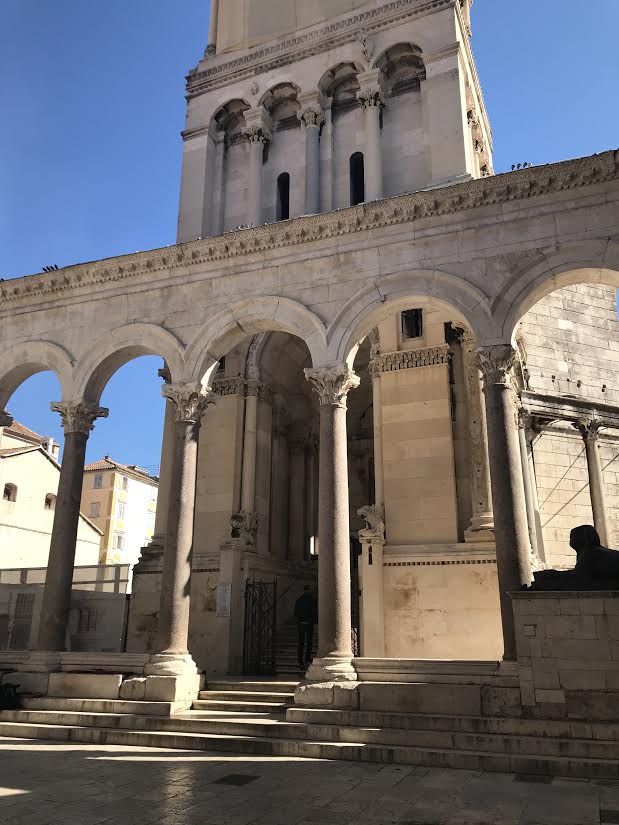
Firstly, how are you? Are you alone/with someone? Tell us a little about your situation and sanity levels.
I am alone. Very alone. I am an American digital nomad in my 50s from California, up until now traveling the world and enjoying every minute of it. This is my second spring in Croatia. This year I’m in Trogir. Things could be worse. I am still working online with my clients in the US, but wondering daily when they will either a) get in trouble for violating stay at home rules b) contract the virus. While I worry for them, I also have mixed feelings and am glad they are working, so I can be working.
Before the movement restrictions went into place, I woke at 7, went for a 6-mile walk, attended my swimming aerobics class in Split, shopped at the fish and fruit/veg markets, took in a museum, went to a play or got a massage and possibly went for a drive. My day now consists of sleeping till sometime between 10 am and 1 pm. Spending some time cleaning, pulling weeds in the yard of my cute apartment, watering the flowers, laying in the sun and then getting to work at 4pm when my clients are up and about on the US west coast. I keep promising myself I’m going to learn Spanish but don’t seem to get around to it. Instead I work until midnight or 1 am and then watch Netflix till 3 am, go to bed and start all over again. What is today?
My life is boring but safe and my sanity has always been in question so this really doesn’t affect it much.
When did you realise that corona was going to be a big issue?
That’s a mixed question. I don’t’ think anyone realized how serious this situation would become. I watched it intently while it unfolded in China, assuming falsely that the western world would take measures to mitigate the damage before it began. I was wrong. Some countries have done better than others, Croatia being one of the better ones, but overall it was something that could have been prevented, planned for and mitigated against, but wasn’t.
I was in London in February and listening to the way they were blithely ignoring the entire situation and discussing herd immunity made me realize I needed to leave while it was possible. I had a choice, go back to America where health care is costly and difficult to get, where the bottom line of capitalism is measured in lives and where my country is currently run by buffoons in a clown car. The option to continue as planned and spend 3 months in Croatia seemed the smarter move. When I arrived at the airport and they asked us where we have been the last three weeks, it hit me things were getting serious.
What is your impression of the way Croatia is dealing with the crisis? How safe do you feel?
I think Croatia as a whole is handling the situation very well. Certain individuals have flouted the restrictions and recommendations and endangered others, but the government overall seems to know who they are and is taking appropriate measures. I feel safe in my little corner of the world. I do get frustrated though with others who are not taking this situation seriously even now. As an example I was in Lidl today. The workers were congregated in front in a tightly packed group enjoying a smoke break with no masks or gloves. The clerk grabbed my card from me to put in the machine even though I wanted to do it myself and there is no one monitoring how packed the store gets. So I wipe, wipe, wipe with disinfectant and keep my distance as best I can while limiting my visits to the store.
Now compare that to your home country and how they are handling it. What is Croatia doing better/worse?
My daughter who is stuck in Dublin due to her University being closed and I discussed whether or not we should seek asylum as health refugees. The US is a complete disaster. My friends who work in healthcare are afraid. Most have already contracted the virus, but were still pushed to work with patients. The bottom line is the most important thing in America. Adding insult to injury the unemployment now being driven by measures met to save Americans is not followed up with public health and food insecurity measures. I have scarred lungs from untreated Valley Fever as a child and Hashimoto’s disease. Normally nothing to be concerned or worried about. I honestly feel if I had flown home to the US I would be dead now. The inability of my country to do much of anything at the federal level at this time is borderline criminal and costing lives. I worry about my son and his wife (a medical doctor) in California due to having their first child in a few weeks.
Croatia seems to understand, not just as a government, but most citizens that a group effort is needed to keep this health emergency under control. I’m hoping the measures in place, such a limiting movement from town to town, social distancing and tracking will keep paying off. I feel infinitely safer here than I would in the US.
What about official communications from the authorities, compared to your home country?
This has been a bit of an issue because I do not speak Croatian. I keep an eye on Total Croatia News to keep me informed. My landlady has been helpful as well in keeping me up to date. I still can’t figure out where to get an actual medical mask from. People seem to have them, but I have had no luck in tracking one down.
I also think there is a bit of an issue with people believing masks and gloves make them immune from catching the disease. A pharmacist in Trogir actually told me a cotton mask would be better than a medical mask because I can wash it. I was dumbfounded he would say that. There seems to be a lack of education on how, why and when masks and gloves work, and how, why and when to use them.
What's the one thing you wish you had taken with you into self-isolation.
BOOKS, BOOKS, BOOKS AND MORE BOOKS. I loved to read and this seems like the perfect opportunity to do so. My children admonish me and tell me to read them on my iPad, but after a day of staring at the computer, looking at another screen just doesn’t hold any appeal to me.
One thing you have learned about yourself, and one thing you have learned about others during this crisis.
About myself I’ve learned I am fully capable of entertaining myself. I started writing a book since I can’t read one and figured out how to do yoga on my living room floor using spare carpet squares. I’m adapting.
About others I’ve learned that we are all interconnected in so many more ways than we realize. That each life is inadvertently affected by what happens on the other side of the world, so our choices and actions affect more than just our bubble. We have a unique opportunity here to affect those outside of our normal with the smallest of actions. We need to take advantage of the opportunity and come out of this situation, not smaller but wiser, with more compassion, more resilience and more love.
Thanks, Rebecca, stay safe and see you on the other side.
TCN is starting a new feature series on foreign experiences of sitting out COVID-19 here in Croatia compared to their home country. If you would like to contribute, the questions are below. Please also include a para about yourself and where you are from, and a link to your website if you would like. Please also send 3-4 photos minimum to This email address is being protected from spambots. You need JavaScript enabled to view it. Subject Corona Foreigner
If you would be interested to record a video version for our partners www.rplus.video please let us know in the email. Thanks and stay safe.
Foreigners Self-Isolating in Croatia: Do You Feel Safer Than in Your Home Country?
Firstly, how are you? Are you alone/with someone? Tell us a little about your situation and sanity levels.
What do you think about the economic measures the government is taking, are they helping your business? (PLEASE IGNORE IF THIS DOES NOT AFFECT YOU)
When did you realise that corona was going to be a big issue?
What is your impression of the way Croatia is dealing with the crisis? How safe do you feel?
Now compare that to your home country and how they are handling it. What is Croatia doing better/worse?
What about official communications from the authorities, compared to your home country?
What's the one thing you wish you had taken with you into self-isolation.
One thing you have learned about yourself, and one thing you have learned about others during this crisis.
TCN has recently become a partner in Robert Tomic Zuber's new R+ video channel, initially telling stories about corona experiences. You can see the first TCN contribution from this morning, my video from Jelsa talking about the realities of running a news portal in the corona era below. If you would like to also submit a video interview, please find Robert's guidelines below
VIDEO RECORDING GUIDE
The video footage should be recorded so that the cell phone is turned horizontally (landscape mode).
There are several rules for television and video news:- length is not a virtue- a picture speaks more than a thousand words
In short, this would mean that your story should not last more than 90 seconds and that everything you say in the report should be shown by video (for example, if you talk about empty streets, we should see those empty streets, etc.).
How to do it with your cell phone? First, use a selfie camera to record yourself telling your story for about a minute and a half. Ideally, it would be taken in the exterior, except in situations where you are reporting on things in the interior (quarantine, hospital, self-isolation, etc.). Also, when shooting, move freely, make sure everything is not static.
After you have recorded your report, you should capture footage that will tell your story with a picture, such as an earlier example with empty streets.
One of the basic rules of TV journalism is that the story is told in the same way as a journalist with his text. Therefore, we ask you for additional effort. Because we work in a very specific situation, sometimes you may not be able to capture footage for each sentence of the report. In this case, record the details on the streets: people walking, the main features of the city where you live, inscriptions on the windows related to the virus, etc.
The same rules apply if you are shooting a story from your apartment, self-isolation, quarantine. We also need you to capture footage that describes your story.
When shooting frames to cover your reports, it is important that you change the angle of the shot (in other words, shoot that empty street from several angles). Also, when shooting a detail, count at least five seconds before removing the camera to another detail.
The material should be about 5 minutes long (90 seconds of your report + frames to cover your story).
After recording everything, send us to Zagreb, preferably via WeTransfer to This email address is being protected from spambots. You need JavaScript enabled to view it.
He's Back! Dario Jurican aka Milan Bandic New Show: Lets Go Stealing
April 6, 2020 - He was the star of the recent Croatian Presidential campaign, and now erstwhile presidential candidate and Zagreb mayor namesake wannabe Dario Jurican, aka Milan Bandic is back with a new show - and the world is suddenly a better place.
Even though life is brutal at the moment with my own corona economic realities, coupled with the need to work 15-16 hours a day to mitigate the disaster, I can honestly say that I have never been more challenged or fulfilled professionally.
Trying to deliver the content so many non-Croatian speakers are looking for at this time of crisis is TCN's priority, and I am so proud of our little team who have gone above and beyond the call of duty in the last few weeks.
Everyone's world has been turned upside down, and I find that it has levelled the playing field in a number of ways. People I would perhaps never associate with are now great online friends.
I am having the most sensational daily exchanges, for example, with the man who is doing more than most to advise our leaders on how to save our species from extinction - eminent Croatian scientist, Igor Rudan. TCN editor Lauren Simmonds is translating much of Igor's work, and I somehow get to be a fly on the wall in their daily chats, and sometimes feel brave enough to make a comment or two.
I am also in daily contact with legendary documentary maker, Rober Tomic Zuber, whose new R+ video channel is proving to be an absolute hit. I am learning a LOT from the master.
And so it was perhaps fitting to get a message from Robert this evening that he had a new contributor on his new channel - another hero of mine who has been in touch with me recently. Dario Jurican, aka Milan Bandic, whose brilliant anti-corruption campaign as a Presidential campaign was one of the highlights of 2019.
And if you expected Dario Jurican to go away quietly...
Director Dario Jurican on Wednesday, 8th April 2020 will air the first episode of his new series titled “Let’s steal!”.Director Dario Jurican on Wednesday, 8th April 2020 will air the first episode of his new series titled “Let’s steal!”.
“The first episode is called #Bundekfest and thematizes USKOK’s indictment of “acting” on the 2014 Bundekfest and Advent 2013 festivities. The aim of the series is to educate an ordinary man on how to steal!
I dedicate the first episode to the Cinema Europa, which was closed without any real plans by the mayor Milan Bandic, the biggest pest in the city of Zagreb, with partners who support it – HDZ and Prime Minister Andrej Plenkovic.
Of course, one should not forget the role of the perpetrator and the political misfit: Davor Bernardic called Badger and Zvana Brumnic called Hero.
8th April was chosen as the premiere date because on that day, Cinema Europa was opened.
Cinema Europa Happy 95th Birthday!
Dario Jurican, Mayor of the Universe”
#stayhome
Zagreb Mayor Does Not Blame Citizens for Earthquake
ZAGREB, April 6, 2020 - Zagreb Mayor Milan Bandić said on Monday that he had never accused Zagreb residents of the March 22 earthquake but that citizens, the city and the state were responsible for the damage caused by the quake to their property as they had not invested in it.
Addressing a news conference, Bandić accused reporters of misquoting his statement that "citizens are to blame for the earthquake", saying that nobody was to blame for it but that the failure to invest in one's own property was to blame on both the state and the city as well as its residents.
Responding to a reporter's remark that his previous statement was "a slap in the face for Zagreb residents", Bandić asked the reporter why she was nervous, accusing her of interrupting him and noting that she could not be helped.
Asked why he had decided to hold daily news conferences only two weeks after the earthquake and a month a half since the start of the coronavirus pandemic, Bandić said that "things had to be organised."
Bandić said that the city budget would be revised in two weeks' time.
"Today you will have a decision on provisional financing, with priorities. This is not only the city's problem but a national problem. Only together can we cope with it," said the mayor, adding that a law should be passed to regulate the process of reconstruction in Zagreb and that the most severe cases, people who cannot return to their homes, would have priority.
He said that everyone would pay for the reconstruction of their own property - the city for its own, the state for its own and the city and state together for citizens' property that is treated as a priority.
Bandić said that the city would make apartments it owns available to everyone left without a roof over their heads and that in the autumn the construction of 300 flats would begin in the neighbourhood of Podbrežje.
More Zagreb news can be found in the Lifestyle section.
Defence Minister Stresses Importance of Information Sharing Amid Coronavirus Crisis
ZAGREB, April 6, 2020 - Defence Minister Damir Krstičević on Monday stressed the importance of information sharing in safeguarding public health in Croatia and the European Union. "We will share national experiences in providing support to civilian institutions, with emphasis on further strengthening cooperation and solidarity among the EU member states," Krstičević told the press in Zagreb ahead of a video conference of EU defence ministers, the first such conference on efforts aimed at containing the coronavirus pandemic.
The emergency meeting will be chaired by EU High Representative for Foreign Affairs and Security Policy Josep Borrell.
Krstičević said that the meeting was important because of sharing experience and information. "As we can see, we need to adapt and do our best to safeguard the health of our citizens in Croatia and in the EU," he added.
He underscored Croatia's prompt response to the coronavirus outbreak, including measures aimed at "healthcare, safety, education and the economy."
Krstičević said that the Croatian military had played an important role in assisting the healthcare system, citing the erection of tents for patients outside the Dubrava hospital in Zagreb.
He said that he would inform his EU counterparts of the strong earthquake that had struck Zagreb on March 22, which made the fight against the coronavirus more difficult.
"We had two crisis situations at the same time, and the Croatian army, as part of the homeland security system, responded to the earthquake in a timely fashion as well," Krstičević said.
More coronavirus news can be found in the Lifestyle section.
Croatia's Islands: Few Coronavirus Infections Betray A Dark History
April 6, 2020 — The Bura swung then pummeled the island of Iž along its flank. “Bura de levantara,” as the elderly call it. The air was briny. The seagulls hung suspended in the sky, beaks piercing the wind.
The coronavirus yesterday claimed the life of a middle-aged, otherwise healthy man — the first such victim in Croatia. Yet on this island and many other bucolic, empty hideaways, you’d never know there was a pandemic.
The nation's islands have been spared the brunt of the COVID-19 pandemic. Infections remain low, with Murter being the lone exception.
Locals admit their feeling of safety comes with a dose of guilt... and fear that every island's inoculation against this global pandemic is mere luck. Luck which may run out.
“Ne izazivaj vraga,” they say. Don’t tempt the devil. Indeed.
Women of a certain age still say, “Kuga te ubola.”
It loosely translates to “May the plague get you.” Depending on the context, it’s either a curse against an enemy or expression of delighted shock at inappropriate humor.
It’s still in use for a reason. Because Iž and other islands like it suffered terrible losses during previous pandemics. The Bubonic plague, cholera and Spanish Flu swept through these coastal hideaways like a tsunami.
COVID-19 is the outlier — for now.
Familiar with plagues
Virtually every deadly pathogen that hit Europe also swept across Croatia's islands. Anecdotes, church records and census numbers show odd demographic oscillations so precise, they can’t be the usual harbingers of death — war and famine. Process of elimination leaves only disease.
The Bubonic plague hit Zadar 20 times between the sixth and 17th centuries, according to late historian and Iž native Dr. Roman Jelić. The plague became so common, locals built churches, chapels and altars devoted to Saint Rocco, who protected against the illness (Mali Iž’s altar among them).
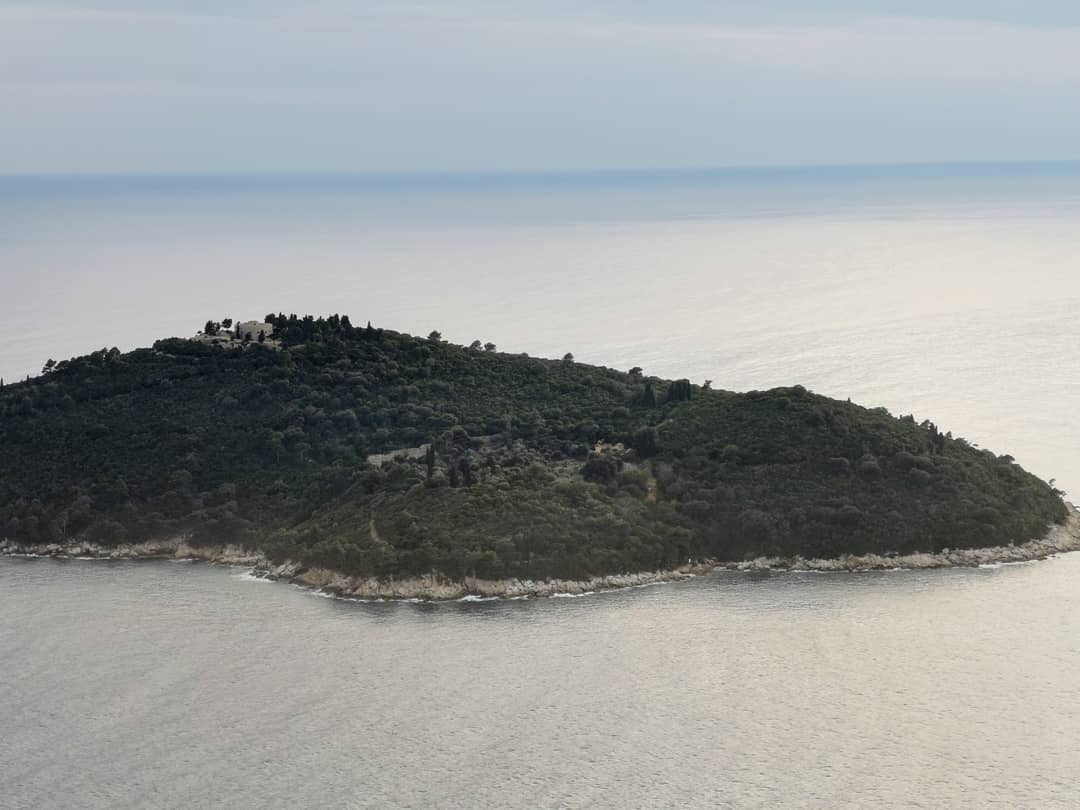
The island of Lokrum served as a lazaret for Dubrovnik during the Black Death. The innovation quickly spread.
As the plague hit over and over, Zadar’s islands coopted an efficient system of stopping the spread of the illness, one recognizable today and oft-attributed to Dubrovnik. Good ideas, like plagues, often spread quickly.
Confirmed infections on islands went to lazarettos, or infirmaries, built in the hinterlands or the uninhabited islets. This early form of the quarantine and forced self-isolation set the foundations for the current fight against COVID-19.
Still, the numbers were staggering.
The island of Ugljan at the end of 17th century lost nearly 10 percent of its population in a single year. Records suggest the plague swept through the island, end-to-end, with the neighboring islands Galevac and Ošljak serving as lazarettos for the ill.
A century later, Molat lost 141 residents — more than a quarter of its population — in the four years between 1772 and 1776.
Medieval medicine at the time included some isolation measures, but hygiene and knowledge of microscopic killers were non-existent. The islanders of lore were helpless to stop the viruses. A full-time medical professional on a Dalmatian island is a modern invention, arriving about the same time as electricity.
Other deadly pathogens followed the plague: diphtheria, smallpox, scarlet fever, typhus, dysentery, and the Spanish Influenza. The lazarettos built for Black Death sufferers remained, repurposed for every new disease.
No one to infect
The modern coronavirus pandemic in Croatia began around in the beginning of March. Not that anyone on the islands noticed a difference.
The newer houses built by foreigners sat dormant — as usual. The other homes grow quiet, one by one, every time the death bell tolls.
The coronavirus’s great gift to Dalmatian islanders was its timing. It arrived during the annual stretch of ghoulish emptiness that leaves one wondering if anyone lives here at all. Had it hit two months earlier or later — New Years or the summer — and the situation would look bleaker.
The few who live here all year emerge from their homes every morning. Some split olive wood to prepare stoves for the single match that’ll heat their house at sunset. Others wait in line for a loaf of bread.
All have routines to survive early March: the temperature fluctuations and bitter wind sweeping down from the Velebit Mountain make it a torturous time. That signature March Bura. The “healthy” wind which pseudo-scientists around here claim is a panacea for many ailments.
It clears humidity out of the air, they say. Dries the sinuses, leaves a crust of salt on doors and windows. It cuts through the thickest of jackets.
Winter life will keep us safe, they say. Here, the winter sun is medicinal. (From April onwards, it’s a menace.)
Social isolation doesn’t need a mandate here either. At this time of year, it’s the norm.
If COVID-19 found its way to islands like Iž, it’d lack hosts. The regulars on the island keep a safe distance from each other — blame water-saving over hygiene, emotional suppression, and the disinterest that comes with seeing the same faces at the same time every day. Attempts at physical contact betray a too many drinks… or fair-weather friend trying to make good with the locals. We know better.
When a biting wind sweeps across your face and sends a chill to the base of your skull, a hug or a handshake feels ridiculous. Head nods and grunts are enough.
No well-wishers, family members, weekend visitors, or preparations for summer flings. Save a weekend bacchanal for carnevale, or perhaps a funeral, you’d be hard-pressed to find anyone visiting Iž or any of the other smaller islands before Easter.
Still Following Protocols
Make no mistake: people here follow the rules with aplomb. The store only allows one patron at a time, each greeted with a squirt of hand sanitizer at the door. The others wait outside in a haphazard line, with each new arrival pointing a questioning finger to see who’s ahead of them.
This rationing and pseudo-caution that comes with assuming everyone is a vector for a virus is familiar. The history of population-wide illness left a mark on many island norms.
In a long enough conversation, someone will mention a distant ancestor known to have died of… something. Those tales still circulate, along with the centuries-old quack medicine for combatting the illnesses.
Locals also used to fumigate their houses with burning juniper bushes to oust the plague. While nobody smokes themselves out of their own home, islanders still have an immeasurable fear of drafts — a well-documented phenomenon that dates back to the era when tuberculosis, common colds and pneumonia were death sentences.
It’s still customary for a visitor to shout your name a few steps before they arrive at your door — a bit of common courtesy predating doorbells but also a chance to be sent away without getting too close.
Folk medicine remedies are still common. Every bodul (islander) shoveling spoonfuls of honey into their gullet to combat a cough can thank their ancestors, who did the same to survive tuberculosis and pneumonia. Ditto to inhaling the vapors from sage or chamomile tea, a centuries-old remedy for pulmonary illnesses.
Some islanders even continue to pile on layers of clothing and blankets to treat a fever, believing it helps the body cook out the pathogen. These treatments are still being suggested to young islanders with the fervency of Gospel.
Perhaps the closest the islands saw to today’s pandemic was the cholera outbreak of 1855, which hit every settlement on every island in the Zadar archipelago. The incomplete records from the time show 7,770 people were infected, 2,690 of them died. A 34 percent mortality rate. (It should be noted Patient Zero arrived from Italy.)
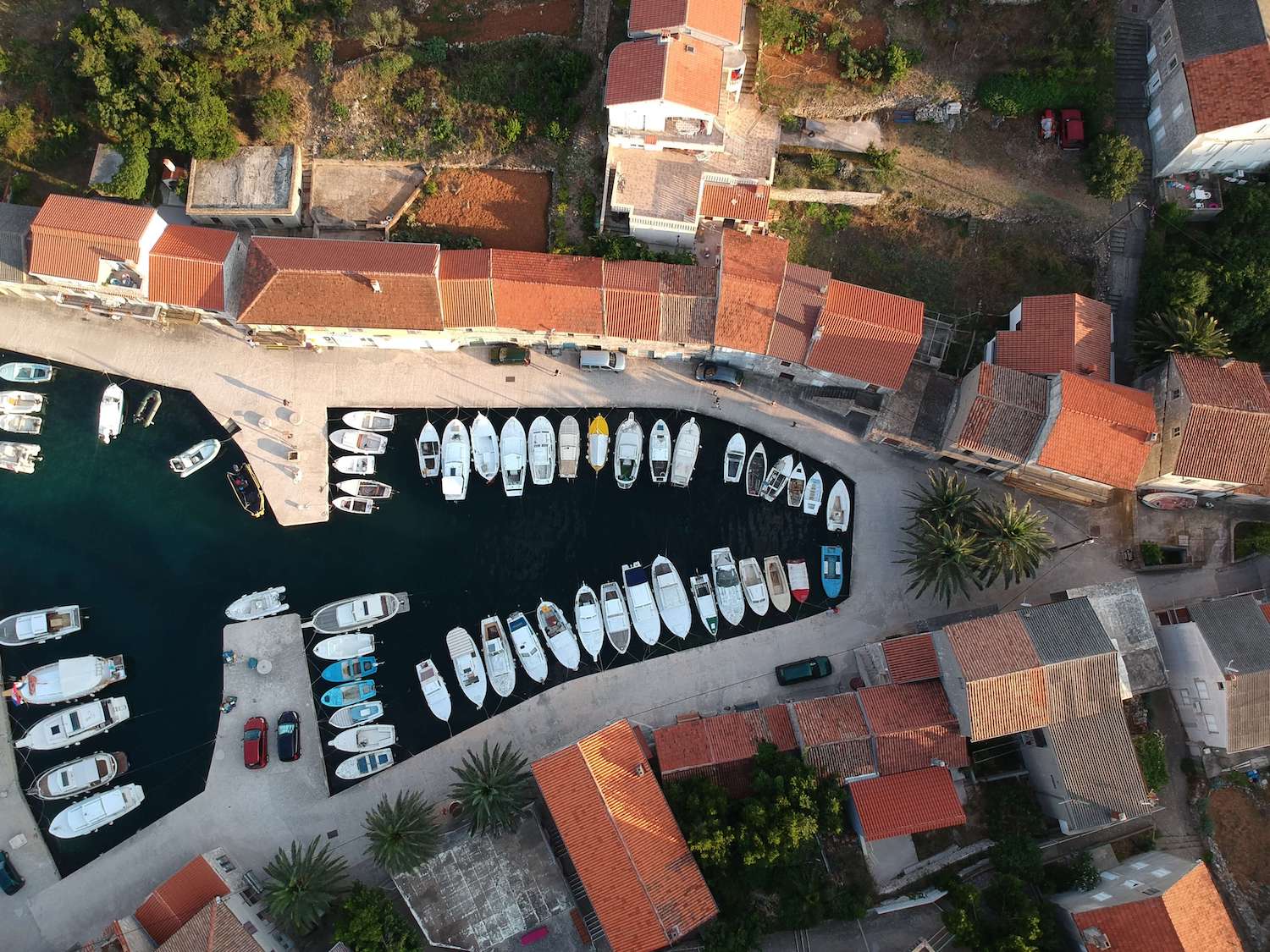
The author's home: devoid of people whether there's a pandemic or not.
Offering An Escape
During past the pandemics, those fearing death often fled to the Dalmatian islands. It may happen again.
Already detached from societal epicenters, the potential for an island becoming a pandemic hotbed disappeared over the last century, as islanders emigrated to the generous shores of Canada, Australia and the United States. Even Murter, now a hotbed, had its COVID-19 allegedly imported by tourists who wanted to get an early start on "The Season."
That's not to say the islands like Iž and others are immune to nasty pathogens and the ornery nature of life on this planet. But maybe the four-mile gap between these shores and the mainland is just enough to keep the inhabitants safe.
That sense of detachment and self-sufficiency fuels the people living here year round. But the longer this pandemic lasts, the supposed-faults of island life will slowly become appealing to The Crowd. Those who often shun a quiet existence to be at the vibrating center of modern civilized life. Their norms are now poisoned.
Isolation, solitude, peace, and detachment from the throngs, shopping centers, cultural institutions and a quiet social life... are now luxuries. And potential life-savers.
A parade of fresh faces uprooting their homes to these islands is inevitable. They’ve already made calls, promising to be here soon. They’ll join a long and storied tradition: escaping to the Dalmatian islands for refuge.
It’s something those of us with roots here all share: there is no native bodul. Everyone came here to escape from something: fights between Venetians and Ottoman Turks, famine… plagues.
This pandemic will end. The sun will continue to rise just behind the neighboring island of Ugljan and settle in the west behind the church steeple at the top of the hill. Like it always does.
Those still alive when this is all over will tell their kids and grandkids what it was like to watch fraction of the world suffer even though the illness touched nearly everyone.
And those who passed the time on Croatia’s bucolic little islands will hopefully shrug and say, “Nothing really changed for us. A few more people showed up and, when it was over, they all left.”
Don't tempt the devil.
Corona Voices in the Croatian Diaspora: Aleksandar in New York City
April 6, 2020 - With as many Croatians living abroad as in the Homeland, what are the diaspora experiences of self-isolation? In the fourth of a new series, Corona Voices in the Croatian Diaspora, here is Aleksandar Bulajic from New York City.
Last week TCN started a feature series called Foreigner Self-Isolation In Croatia: Do You Feel Safer? I can honestly say we have never had such a response or so many incredible contributions. The countries of origin of these expats in Croatia literally from all over the world. So far we have had submissions from expats from Romania, USA, Ireland, UK, Mexico, Argentina, Spain, Singapore, Holland, Canada, India, Hong Kong, Venezuela, Latvia, China, Honduras, Hungary, Moldova, New Zealand and Germany. You can see all their stories here.
Given the success of the series (still going strong) and large interest, it made sense to expand it to look at this from another angle - how Croatians abroad are coping where they are. If you would like to contribute your story to Corona Voices in the Croatian Diaspora, please find the submission guidelines below. And now, the view the centre of the pandemic currently - New York City. We are very grateful to New York resident Aleksandar Bulajic for this account of his current reality and view of Croatia.
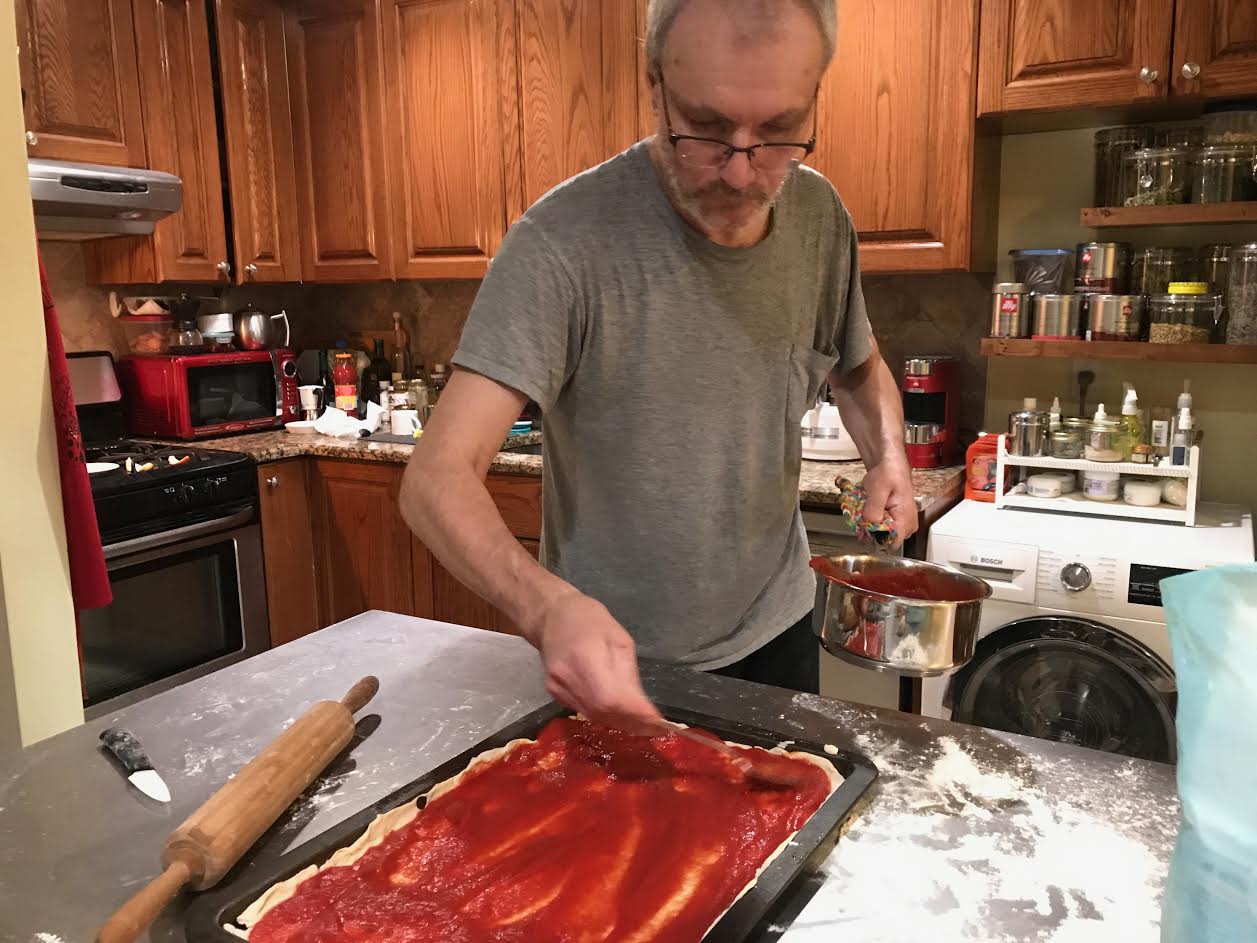
Firstly, how are you? Are you alone/with someone? Tell us a little about your situation and sanity levels.
I’m living with my partner DJ, she’s American, along with our two cats, Jožek and Arlo. My teenage son Luka lives in Columbus, Ohio, with his mom. Luka and I would typically see each other once a month, at least until now. All-in-all, we’re doing, ‘knock-on-wood’, well. Monday, April 6, 2020 marks the start of our fourth week in self-isolation.
Like many others in the restaurant business, I lost my job when our restaurant closed its doors. Delmonico’s first opened in 1837 - and as a cultural institution and barometer of NYC health, we’re hoping it and other businesses open soon again.
Thankfully, DJ is still working full-time. She’s an architectural and graphic designer with the international firm Rockwell Group. It took some adjusting for us to be working from home, though so far we’re handling this unprecedented situation fairly well.
When did you realize that coronavirus was going to be a big issue?
When Italy started falling apart — it was I think in the first week of March, when the number of deaths started going up like crazy — that I realized the coronavirus was going hit the US and the world like a tsunami.
When did you realize that coronavirus was going to be a big issue in New York in particular?
When prominent restaurants (like Le Bernardin) and restaurateurs (Danny Meyer, Eric Ripert) began closing their doors, which happened in the first half of March, is when it struck me that this would hit NYC hard. It was like a point of no return. And, in just a matter of days, one of the most populated cities in the world was abruptly a ghost town. To me, it seemed inevitable; there’s no way we can keep such a dense and bustling city as New York out of this pandemic.
Give us a timeline on when and how life changed.
March 16, the day when Delmonico’s ceased operations and I lost my job of seven years. DJ’s office had also started a work-from-home policy on that day. Only days prior, it was merely a discretionary policy, but within two days became part of mandatory office closings throughout New York City.
Tell us about your day. Do you/can you leave your apartment?
Day-to-day, we can leave our apartment, but we try not to unless absolutely necessary. We typically order groceries for delivery, though that is becoming difficult as less people are available to do that job, and shelves are lacking basic goods. Typically when we place an order for groceries, the expected delivery is in three weeks. A small, family-owned grocery store across the street from our apartment has recently closed, and is no longer an option for staples such as toilet paper or milk. If we must go outside, it’s with masks, gloves, and a hat to cover our hair.
Any delivered groceries or packages from outside go through a thorough routine involving both DJ and I to ensure the virus doesn’t enter the apartment.
Living in a NYC apartment building is also a bit tricky in the age of coronavirus. We attempt to avoid neighbors as much as possible — for both our safety and theirs, as the hallways are narrow and shared doorknobs not cleaned since mid-March.
On the brighter side, I’m cooking as never before. Yes, I’m definitely stress baking, though I’m grateful to have small pleasures at this time. And luckily we have a modest backyard that allows for some fresh air, table tennis, and soccer ball practice.
How are the authorities doing at handling the situation?
We are really grateful for having Andrew Cuomo as our Governor. His daily press briefings are delivered with direct honesty and leadership. We truly feel he is fighting for New York State. He’s direct, eloquent, calm, and most importantly, Cuomo is well-informed. He also knows to surround himself with professionals that can address the myriad aspects of how a city is - or may be - affected by this pandemic.
I wish I can say the same for the President of the United States who, by his inaction, is responsible for the exponential spread of this deadly virus that has and will cost numerous lives.
You obviously keep an eye on your homeland. What is your impression of the way Croatia is dealing with the crisis?
Kudos to the government of Croatia, both federal and local. Kudos to everyone in my homeland who is doing a great job with self-distancing, self-isolating, and taking this horror seriously. The right leadership in the right place at the right, critical time. Yes, I’m biased, though it looks like my county Istria — which is the closest one to Italy — is doing a great job.
Compare and contrast the responses of Croatia and USA. Who is doing what better?
Croatia is doing a much better job in fighting this disease than the US, mostly because our federal government has failed in acting on time to curtail this pandemic.
What about official communications from the authorities, compared to your home country?
The daily press conferences by the New York Governor, Andrew Cuomo, are strait-forward, concise, and delivered with knowledgeable leadership. It’s no small wonder that many are asking him to run for the Presidency of the US.
What's the one thing you wish you had taken with you into self-isolation?
More beer for sure. It’s sometimes the small pleasures that make isolation a bit easier.
One thing you have learned about yourself, and one thing you have learned about others during this crisis.
I used to be a full-time journalist, starting in 1997 with Glas Istre, a Croatian daily newspaper. As my late ex-boss Željko Žmak once said to me, “when you got ink under your nails, there’s no way you can get rid of it”. That’s absolutely true. One thing that has shifted is my daily need, and time to write again. I’ve focused on my website Croatian In New York http://croatian-in-new-york.
If you could be self-isolating in Croatia, where would it be, and why?
There’s only one place where self-isolation would be a gift and not punishment: the Island Unije. Back in 2015 DJ, Luka and I spent the most incredible 14 days of our life there. I believe that time spent on islands has a powerful effect on relaxing the mind and body, compared to time spent on a continent. I’m talking about small, tiny islands where one is completely surrounded by the sea. Time slows on islands, where one day of vacation on the island feels like two on the continent.
Thanks, Aleksandar. Stay safe and see you on the other side. You can see all the stories in both this diaspora series, and the one on expats in Croatia on this link.
TCN is starting a new feature series on Croatian diaspora experiences of sitting out COVID-19 abroad and comparing your experiences to the situation in Croatia. If you would like to contribute, the questions are below. Please also include a para about yourself and where you are from, and a link to your website if you would like. Please also send 3-4 photos minimum to This email address is being protected from spambots. You need JavaScript enabled to view it. Subject Corona Diaspora
If you would be interested to record a video version for our partners www.rplus.video please let us know in the email. Thanks and stay safe.
Self-Isolation Voices from the Diaspora
Firstly, how are you? Are you alone/with someone? Tell us a little about your situation and sanity levels.
When did you realise that corona was going to be a big issue?
When did you realise that corona was going to be a big issue in New York in particular?
Give us a timeline on when and how life changed.
Tell us about your day. Do you/can you leave your apartment?
How are the authorities doing at handling the situation?
You obviously keep an eye on your homeland. What is your impression of the way Croatia is dealing with the crisis?
Compare and contrast the responses of Croatia and USA. Who is doing what better?
What about official communications from the authorities, compared to your home country?
What's the one thing you wish you had taken with you into self-isolation?
One thing you have learned about yourself, and one thing you have learned about others during this crisis.
If you could be self-isolating in Croatia, where would it be, and why?
TCN has recently become a partner in Robert Tomic Zuber's new R+ video channel, initially telling stories about corona experiences. You can see the first TCN contribution from this morning, my video from Jelsa talking about the realities of running a news portal in the corona era below. If you would like to also submit a video interview, please find Robert's guidelines below
VIDEO RECORDING GUIDE
The video footage should be recorded so that the cell phone is turned horizontally (landscape mode).
There are several rules for television and video news:- length is not a virtue- a picture speaks more than a thousand words
In short, this would mean that your story should not last more than 90 seconds and that everything you say in the report should be shown by video (for example, if you talk about empty streets, we should see those empty streets, etc.).
How to do it with your cell phone? First, use a selfie camera to record yourself telling your story for about a minute and a half. Ideally, it would be taken in the exterior, except in situations where you are reporting on things in the interior (quarantine, hospital, self-isolation, etc.). Also, when shooting, move freely, make sure everything is not static.
After you have recorded your report, you should capture footage that will tell your story with a picture, such as an earlier example with empty streets.
One of the basic rules of TV journalism is that the story is told in the same way as a journalist with his text. Therefore, we ask you for additional effort. Because we work in a very specific situation, sometimes you may not be able to capture footage for each sentence of the report. In this case, record the details on the streets: people walking, the main features of the city where you live, inscriptions on the windows related to the virus, etc.
The same rules apply if you are shooting a story from your apartment, self-isolation, quarantine. We also need you to capture footage that describes your story.
When shooting frames to cover your reports, it is important that you change the angle of the shot (in other words, shoot that empty street from several angles). Also, when shooting a detail, count at least five seconds before removing the camera to another detail.
The material should be about 5 minutes long (90 seconds of your report + frames to cover your story).
After recording everything, send us to Zagreb, preferably via WeTransfer to This email address is being protected from spambots. You need JavaScript enabled to view it.
North Korea and Uhljebistan: the Only Coronavirus-Proof States in the World?
April 6, 2020 - What do North Korea and the mighty State of Uhljebistan in Croatia have in common in the Corona Era?
(Disclaimer: in these unusual times, it should be pointed out that this is a satirical piece about the mythical - but sadly real - State of Uhljebistan in Croatia. There is no suggestion coronavirus does not have the same effect in North Korea as elsewhere. It should also be noted that Croatia is doing an excellent job battling COVID-19.)
I have lost count of the number of times I have heard or read the phrases 'things will never be the same again' or 'the world has changed forever' in the last month.
And, if we look around at all the horror of the deadly pandemic, the economic screeching to a halt and - not much talked about yet, but it will possibly be the biggest effect of all - the mental health crisis which is already unfolding in its early stages, it is not hard to agree completely with those statements.
But is it true everywhere in the world?
There is - as always - plenty of speculation of the situation in North Korea, for example, which has not shared any information on the effects of the pandemic there.
In these days of dark humour, the situation in North Korea has led to plenty of memes and other funny images to circulate around the web.
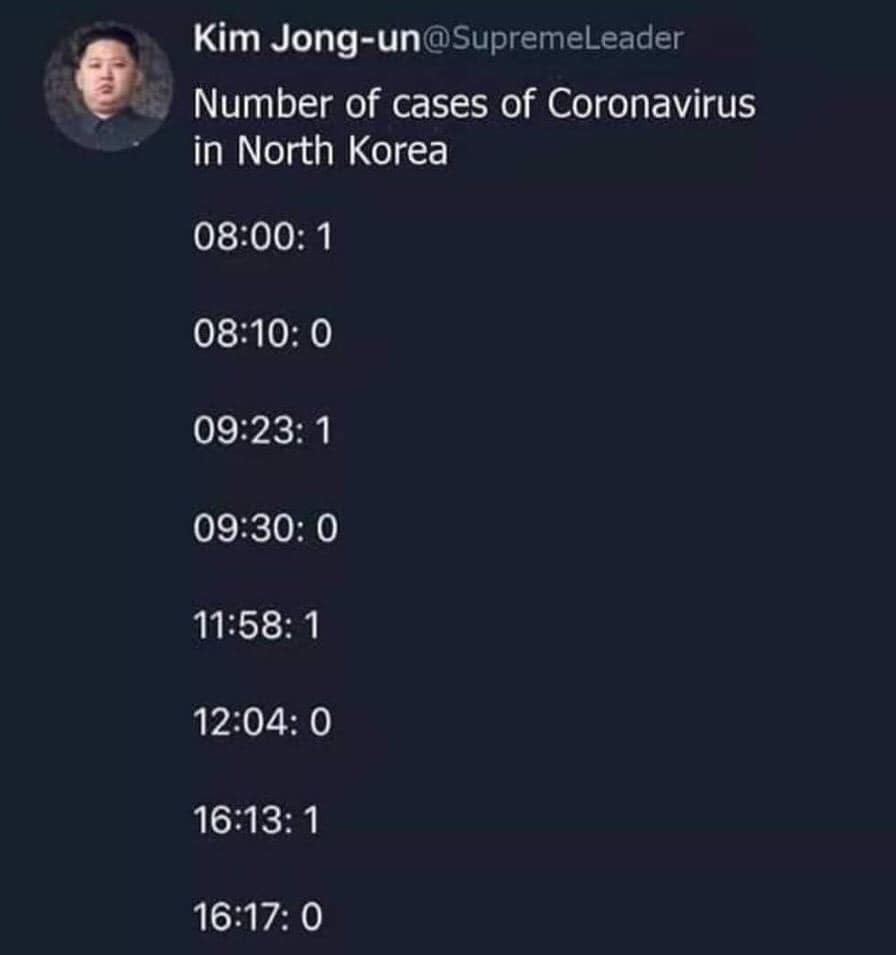
Such as this one, for example, which had a mythical Kim reporting on the daily corona count.
This was sent to be by a friend, and I replied by saying that while it was funny, there might even be an element of truth in it - at least if you believe everything you read in Britain's largest tabloid, The Sun.
Judge for yourself - here is the original article in The Sun.
But there is one mythical state closer to home which is seemingly impervious to the economic chaos brought on by corona - the Mighty State of Uhlebistan, the state within a state in Croatia, whose trademarks are cronyism, corruption and a bloated public administration. You can learn more about the Mighty State of Uljebistan in this foreign appreciation of this very Croatian way of life.
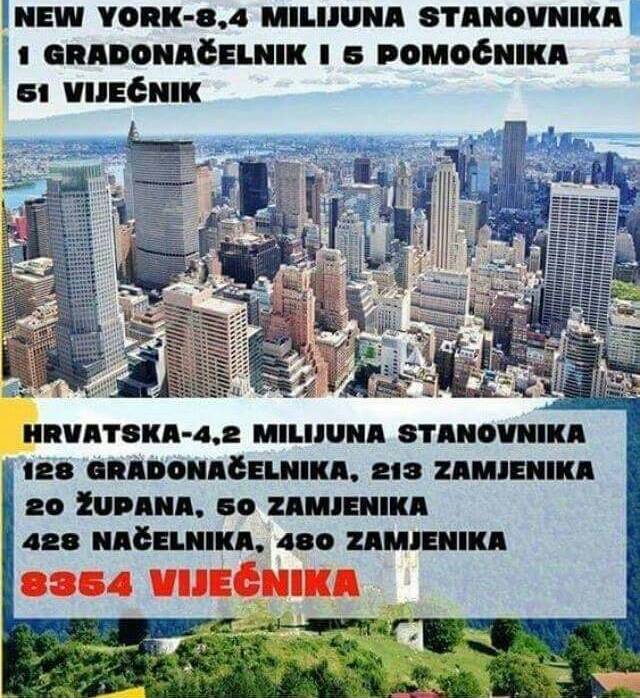
The numbers may not be entirely accurate on this comparison between Croatia and New York (more than 200,000 Croats have emigrated since it hit the web, for example), but it paints a picture.
New York City - population 8.4 million. One mayor, 5 deputies, 51 city councillors.
Croatia - population 4.2 million. 128 city mayors, 123 deputies, 20 county prefects, 50 deputies, 428 town/village mayors, 480 deputies. Total public officials - 8,354.
Index journalist Marko Repecki took a closer look at today's reality in this article (Google Translate is your friend) but perhaps the lead photo says enough - one building has been divided into two different administrative units in Dugo Selo.
Glas Poduzetnika (Voice of Entrepreneurs), a newly-founded association to give a voice to the private sector, has reported that 93% of its member businesses will not be able to survive more than three months in the current climate. An estimated 300,000 private sector jobs could be lost and, as you can see above from the Index chart, almost 12,500 jobs had already been lost by the end of the week.
And in the public sector, the playground of the Mighty State of Uhljebistan (Javni Sektor in the chart above)? Not a single job.
The world may be collapsing, with some 6.6 million unemployed in the United States according to recent numbers, for example, but Uhljebistan? It is impervious to crisis, virus-induced or otherwise.
If there is one good thing that could come out of this corona crisis for Croatia, it would be the spreading of the virus of transparency and change in Croatia's corrupt system. Were that to happen, there would be a considerable upside for the country.
Is it likely to happen? Watch this space, but something will have to give when all the private sector and its payment dues to the Mighty State of Uhljebistan disappear.
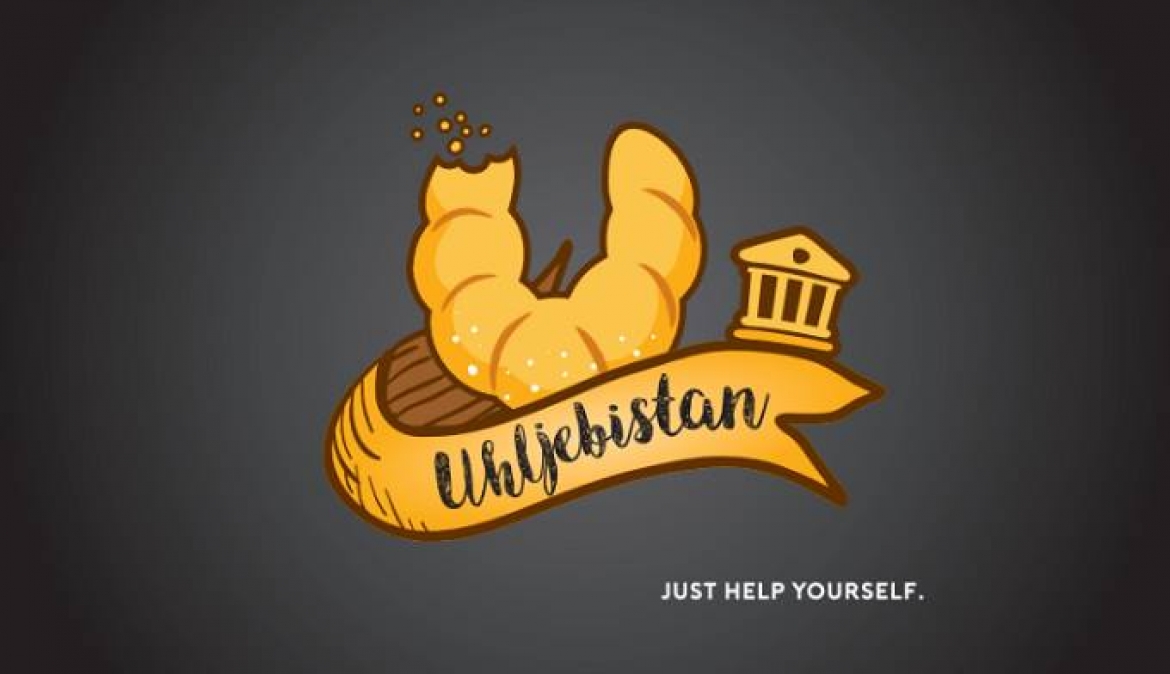
But then how many thought that North Korea would still be holding out in the Hermit Kingdom?
I used to work in Somalia, and aid workers used to joke that if there was ever a nuclear war, only two things would survive - cockroaches and Somalis (they are a very tough nation of survivors).
But they would need somewhere to live, and the only place still standing in all likelihood would be the Mighty State of Uhljebistan.
For the latest on the coronavirus crisis in Croatia, follow the dedicated TCN section.
Natalia Zielinska on Comparison of Polish and Croatian Economic Crisis Measures
As Poduzetnik writes on the 6th of April, 2020, in this text, a consultant and entrepreneur, otherwise a Polish woman living and working in Croatia, Natalia Zielinska, summarises the coronavirus crisis measures taken by the Polish Government to help the troubled Polish economy. As the situation with these figures is changing and updating very quickly, the situation on April the 4th, 2020 is discussed here.
Otherwise, at 16:00 today, Natalia Zielinska is organising a webinar where participants can get a lot of useful advice regarding assistance measures and Hamag-Bicro working capital loans.
The situation in Poland
In Poland, there are currently more than 3,300 infected people and 65 people have sadly died owing to the coronavirus pandemic. The highest number of infected people, more than 800, are located in Warsaw and the surrounding county.
In response to the global crisis, the Polish Government passed a series of laws called the "Anti-Crisis Shield", which entered into force on April the 1st, 2020. While the first package of coronavirus measures in Croatia focused mostly on medium and large enterprises, the Polish Government took the most care of micro-entrepreneurs and those who are self-employed, but it significantly neglected the needs of larger companies, causing various reactions.
Unlike in the Croatian case, the Poles have created a simple and transparent website with links provided to all of the measures, and a separate telephone information line has been opened for all questions and concerns from interested parties.
A summary of measures adopted in Poland
It must be noted that these measures vary considerably depending on the size of the company.
Taxes and contributions
A write-off of losses from last year. This measure is based on the experience of 2008/2009, when losses in annual self-employment reports increased by PLN 30 billion. In this way, a company currently suffering losses (with revenues 50 percent lower than in 2019) will be able to reduce the profit/income from independent business in 2019 by submitting an annex to their report for this year. However, the reduction may not exceed PLN 5 million.
Contribution write-offs
This measure applies exclusively to micro-enterprises which were established before the 1st of February 2020, and the Polish state has taken over the payment of contributions on their behalf for three months (March, April and May 2020).
This measure is approved without the need to demonstrate any sort of drop in company revenue, and the exemption applies to both business owners and employees. Self-employed persons with an income of up to PLN 15,681 (300 percent of the average salary) who pay contributions for themselves will also be entitled to write-offs. In addition, farmers will be entirely exempt. In Poland, farmers pay contributions under a special type of farmers' social insurance (the so-called KRUZ).
Job protection - a package of measures to co-finance wages and increase working time flexibility
This regards the co-financing of employee salaries in the amount of 50 percent, 70 percent or 90 percent of the minimum gross salary, depending on the decrease in income (by 30, 50 or 80 percent). This comes with obligations regarding keeping staff that fall on the employer.
Similar measures are offered to the self-employed, whose income has decreased owing to the coronavirus crisis. An entrepreneur can get from 4,599 PLN in 3 months, with 50 percent drop in turnover, and up to 8,279 PLN with a decrease of 80 percent.
For self-employed persons who earn an income through work contracts or copyright contracts through various agencies, 80 percent of the minimum wage was offered, but exclusively for entrepreneurs whose income did NOT exceed 300 percent in the previous month.
Employment Protection Fee
The quarterly co-financing of salaries and social security contributions for employees, and for entrepreneurs who are experiencing economic downtime or are entering part-time work due to the outbreak. A business owner who has reduced his working hours due to a decrease in turnover may reduce his employee's working time by 20 percent, but not more than 0.5 full-time. 40 percent of the previous quarter's average salary can then be deducted.
Loans for micro-enterprises in the amount of PLN 5,000 (approx. 1200 euros)
Other important changes made by the Polish package of measures include the additional care allowance for children and the disabled and the elderly for a period of fourteen days.
Among the amendments adopted was a very important provision providing for an exemption from the Public Procurement Law for contracts awarded to regional development funds, as in the case of contracts awarded by the Polish Regional Development Fund.
The measure is diverse and depends mostly on the number of employees and the formal legal relationship between the employee and the employer. In order to facilitate communication, but also to provide better information, a separate website has been set up with subpages for all potential users: entrepreneurs, farmers, employees, as well as non-governmental or cultural organisations.
Due to the strong reaction and great dissatisfaction from business owners, mostly those with more than nine employees, a new assistance package is now under preparation.
Some of the main arguments of Polish employers are:
The need to introduce measures that must be made available immediately, based on the statement, and the need for them to be verified after the coronavirus epidemic has passed
The retroactive recognition of aid, at least as of March the 13th, when the introduction of a quarantine was announced due to the coronavirus epidemic, not from the date of entry into force of the Act.
The involvement of medium and large enterprises in these aid measures.
The providing of funds to entrepreneurs to cover costs and damages related to the fulfillment of obligations imposed by public authorities and headquarters in the fight against coronavirus (such as assistance to JLSs and healthcare institutions).
The need for government funding for sick leave (currently funded by employers for 33 days), especially in case of sick leave due to coronavirus or because of quarantine.
The need to shorten the VAT refund deadline as soon as possible.
The exemption from VAT. In Poland, VAT is paid into a separate account if it is being paid immediately.
The need for the suspension of current tax audits and the cancellation of new tax audits.
The removal of work restrictions on Sundays (for easier access to required products and also for difficult business-to-business situations).
The need to increase Poland's budget deficit.

